★½
“Die Hard in a saloon.”
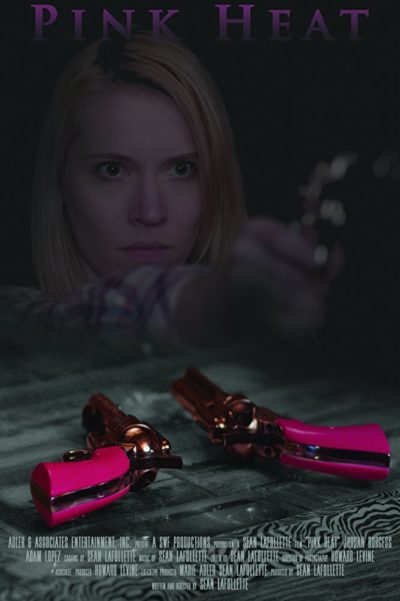 You know you’re deep into one-man, to put it mildly, film-making territory, when the same name gets 7½ of the first 10 credits (one is shared). That’s spreading your talents thin, even if you are Steven Spielberg. And Sean LaFollette definitely isn’t Spielberg. The story is told in flashback, with the heroine Elizabeth (Burgess) the proud recipient of two pink-handled revolvers for her birthday. While she’s off getting her gun-belt, the family saloon is invaded by a group of out of town criminals, who take the rest of her family hostage, and shoot her grandfather dead. Fortunately, Elizabeth takes after her late mother, who was a crack-shot, and is therefore in a good position to pick apart the perpetrators.
You know you’re deep into one-man, to put it mildly, film-making territory, when the same name gets 7½ of the first 10 credits (one is shared). That’s spreading your talents thin, even if you are Steven Spielberg. And Sean LaFollette definitely isn’t Spielberg. The story is told in flashback, with the heroine Elizabeth (Burgess) the proud recipient of two pink-handled revolvers for her birthday. While she’s off getting her gun-belt, the family saloon is invaded by a group of out of town criminals, who take the rest of her family hostage, and shoot her grandfather dead. Fortunately, Elizabeth takes after her late mother, who was a crack-shot, and is therefore in a good position to pick apart the perpetrators.
Die Hard? More like Die Limp. For there’s almost nothing here that reaches the level of competent, from the ill-conceived structure through to the ridiculous and pointless voice-over. This includes such gems as, after Elizabeth rescues her boyfriend, “I ran to Mark. I was relieved to know that he was alive.” That should be a script direction, not a voice-over: “Elizabeth runs to Mark, clearly relieved to know he is alive.” Then there’s the heroine’s style of gun-fighting, which would be better suited to a primary school playground than taking on hardened criminals. A gun in each hand, she thrusts her arms forward alternately while firing, a hardly credible approach extremely unlikely to generate accuracy, and with the unfortunate effect of making her resemble a train engine in motion. And we are provided with absolutely no explanation for the criminals’ actions: what exactly are they trying to achieve by the taking of hostages?
Probably the most aggravating part of the entire production, however, was the music – a LaFollette composition, naturally. He seems to be going for a minimalist, John Carpenter vibe. It doesn’t work, and sounds simply as if he was only able to afford half the notes on a musical scale. Because the soundtrack consists of a series of pieces, in which four notes are repeated in strict succession, for however long is necessary for the scene in question. Even in a film of low standards like this, it’s quite outstandingly bad, and if it hadn’t been LaFollette the director giving an approving nod to LaFollette the composer’s work, would surely have rapidly resulting in a replacement being sought.
Positives are not easy to find. I did quite like the opening, which feels like a pastiche of Western movie cliches… because that’s exactly what it’s intended to be, since it’s a show put on for tourists. Burgess does at least look the part – albeit rather more so when attired in her mother’s long coat and Stetson, rather than wandering the house in some fairly gratuitous underwear! However, you’ll be hard pushed to remain interested through to a climactic battle which includes the bad guy pausing in the middle of a fight for his life to take a swig of whisky, before a final resolution which literally had me rolling my eyes in my head.
Dir: Sean LaFollette
Star: Jordan Burgess, Adam Joseph Lopez, Joey Catalano





 Business is on the streets, check it out.
Business is on the streets, check it out.










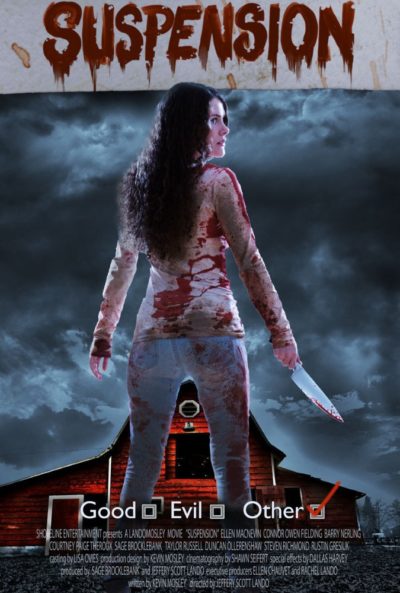 Bullied by her peers at high school, Emily (MacNevin) takes refuge in drawing. Although, rather than high art, her preferred method of expression is horror comics: working on these in class is what gets her the titular punishment, imposed by a disapproving teacher. Emily’s strip depicts the havoc wreaked by a serial killer – who might (or might not) be inspired by her absent father. However, the line between imagination and reality becomes blurred, and on the night of a student party to which Emily has not been invited, someone starts stalking and murdering those who have tormented her. Looks like Daddy is out, and protecting his little girl – or, is he?
Bullied by her peers at high school, Emily (MacNevin) takes refuge in drawing. Although, rather than high art, her preferred method of expression is horror comics: working on these in class is what gets her the titular punishment, imposed by a disapproving teacher. Emily’s strip depicts the havoc wreaked by a serial killer – who might (or might not) be inspired by her absent father. However, the line between imagination and reality becomes blurred, and on the night of a student party to which Emily has not been invited, someone starts stalking and murdering those who have tormented her. Looks like Daddy is out, and protecting his little girl – or, is he?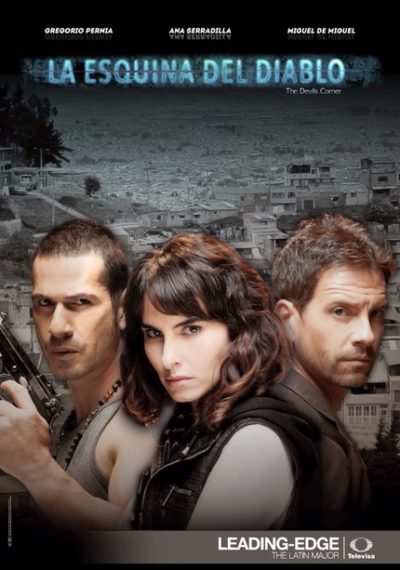 You’re in deep in Devil’s Corner
You’re in deep in Devil’s Corner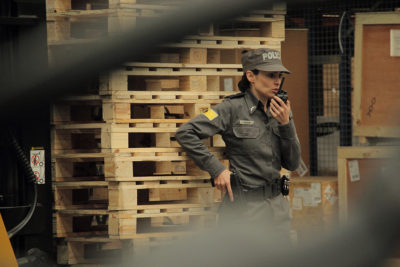 Phew. This cornucopia of plot-lines likely both the series’s biggest strength and its greatest weakness. There’s no doubt it’s actually very well-handled by the writers and cast: even the relatively minor characters are given an impressive amount of depth, and the script never gets jumbled or confused. This is a sharp contrast to Camelia la Texana, the show I’m currently watching: you don’t so much follow the plot, as desperately cling to it, as various groups of sideburn-wearing people scheme against each other. It’s also a contrast, in another way, to Viuda Negra, which was unashamedly about Griselda Blanco. In this case, the breadth of focus inevitably leads to a dilution of why we’re here, with poor Ana often sidelined.
Phew. This cornucopia of plot-lines likely both the series’s biggest strength and its greatest weakness. There’s no doubt it’s actually very well-handled by the writers and cast: even the relatively minor characters are given an impressive amount of depth, and the script never gets jumbled or confused. This is a sharp contrast to Camelia la Texana, the show I’m currently watching: you don’t so much follow the plot, as desperately cling to it, as various groups of sideburn-wearing people scheme against each other. It’s also a contrast, in another way, to Viuda Negra, which was unashamedly about Griselda Blanco. In this case, the breadth of focus inevitably leads to a dilution of why we’re here, with poor Ana often sidelined.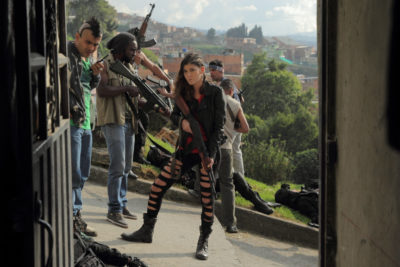 There are a lot of interesting supporting characters: not so much Eder and Yago, who are fairly cookie-cutter in terms of being opposing romantic heroes, with dark, troubled (and somewhat shared) pasts. It’s mostly on the fringes of Velasco’s gang that all the fun is to be found. Cachalote (Julián Caicedo) is a burly thug with a surprisingly soft heart – he has an unrequited crush on the mayor’s daughter, formed during her kidnapping. Meteoro (Erick Leonardo Cuellar) is the gang’s drug chemist, though he looks and acts like a methed-up version of Giorgio Tsoukalos, from the Ancient Aliens show. Most notable of all is Michelle (Estefania Piñeres, right), a hard-nosed barrio brat who is more than capable of holding her own in the tough environment, and is ferociously loyal to her boss. She would have enough stories to tell for her own, lengthy series, I’ve no doubt about that.
There are a lot of interesting supporting characters: not so much Eder and Yago, who are fairly cookie-cutter in terms of being opposing romantic heroes, with dark, troubled (and somewhat shared) pasts. It’s mostly on the fringes of Velasco’s gang that all the fun is to be found. Cachalote (Julián Caicedo) is a burly thug with a surprisingly soft heart – he has an unrequited crush on the mayor’s daughter, formed during her kidnapping. Meteoro (Erick Leonardo Cuellar) is the gang’s drug chemist, though he looks and acts like a methed-up version of Giorgio Tsoukalos, from the Ancient Aliens show. Most notable of all is Michelle (Estefania Piñeres, right), a hard-nosed barrio brat who is more than capable of holding her own in the tough environment, and is ferociously loyal to her boss. She would have enough stories to tell for her own, lengthy series, I’ve no doubt about that. Valerie Graves (Osborne) is a powder-keg in her mid-twenties, barely surviving from job to job, and troubled by violent dreams. At a party, she meets Andy Cheney, who runs a locksmith company, and who offers her an admin job there. She eventually discovers the company is a front for far more questionable business, and eagerly accepts Andy’s offer of working on that side, collecting debts and enforcing his authority on those lower down the food-chain. But when one of her missions ends up hitting too close to home, she decides she’s going to quit. Her boss doesn’t take kindly to that, and stiffs her of the final payment she needs to set up life somewhere else. Which, needless to say, does not sit too well with Valerie.
Valerie Graves (Osborne) is a powder-keg in her mid-twenties, barely surviving from job to job, and troubled by violent dreams. At a party, she meets Andy Cheney, who runs a locksmith company, and who offers her an admin job there. She eventually discovers the company is a front for far more questionable business, and eagerly accepts Andy’s offer of working on that side, collecting debts and enforcing his authority on those lower down the food-chain. But when one of her missions ends up hitting too close to home, she decides she’s going to quit. Her boss doesn’t take kindly to that, and stiffs her of the final payment she needs to set up life somewhere else. Which, needless to say, does not sit too well with Valerie.
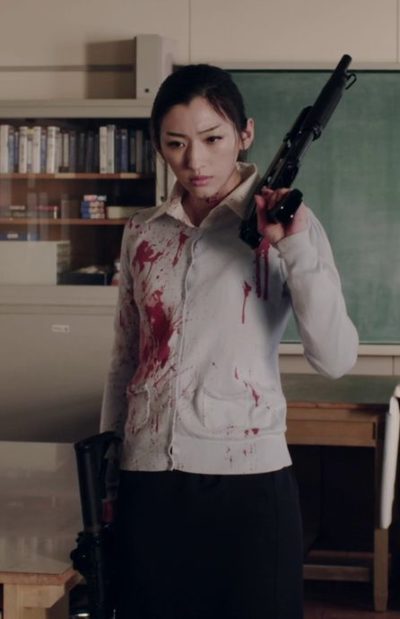 A bus full of Japanese schoolgirls includes the quiet, poetry-writing Mitsuko (Triendl), who drops her pen. Bending down to pick it up, she thus survives the lethal gust of wind which neatly bisects, not only the bus, but the rest of her classmates. Ok, film: safe to say, you have acquired our attention. [Not for the first time the director has managed this: the opening scene of his Suicide Circle is one we still vividly remember, 15 years later]
A bus full of Japanese schoolgirls includes the quiet, poetry-writing Mitsuko (Triendl), who drops her pen. Bending down to pick it up, she thus survives the lethal gust of wind which neatly bisects, not only the bus, but the rest of her classmates. Ok, film: safe to say, you have acquired our attention. [Not for the first time the director has managed this: the opening scene of his Suicide Circle is one we still vividly remember, 15 years later]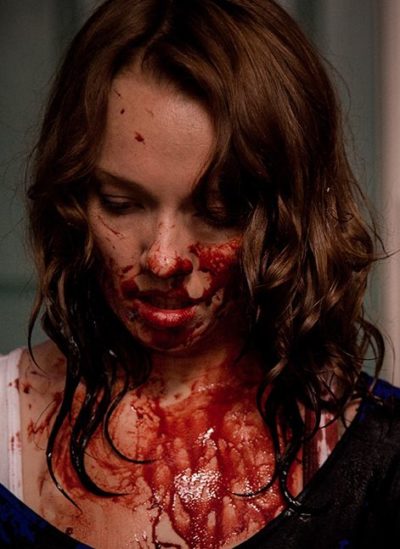 The horror genre has a tangential connection to the action heroine one, most directly through the concept of the “final girl” – when the last person left alive is a woman who confronts and defeats the threat. From Halloween to Alien, this has been a staple of the genre, but whether it qualifies a film for inclusion here, depends largely on what has gone before. For example, 10 minutes of frantic action at the end can’t counterbalance the first 80, if the focus there was not on a female lead.
The horror genre has a tangential connection to the action heroine one, most directly through the concept of the “final girl” – when the last person left alive is a woman who confronts and defeats the threat. From Halloween to Alien, this has been a staple of the genre, but whether it qualifies a film for inclusion here, depends largely on what has gone before. For example, 10 minutes of frantic action at the end can’t counterbalance the first 80, if the focus there was not on a female lead.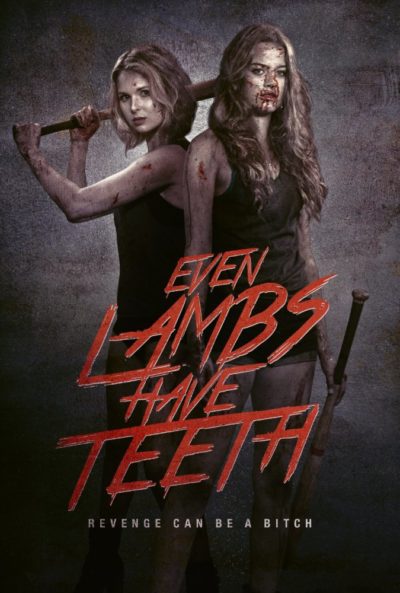 Katie (Skovbye) and Sloane (Prout) are teenage BFF’s, who head off to spend time on an organic farm – though their real goal is the weekend shopping in New York which will follow it. On the way, they are distracted by a couple of bits of prime young, rural manhood. But before you can say “roll in the hay,” they are drugged, the pair waking up to find themselves chained to duplex shipping containers, from where they are rented out as sex slaves to anyone interested. Their sudden dropping off the grid concerns Katie’s uncle Jason (Richards), who happens to be an FBI agent. He heads to the area to investigate, unaware the local sheriff is in on the plot. However, there’s only so far you can push a person, before they break. When Katie and Sloane snap, and escape, rather than heading for safety, they decide to stick around, so they can get thoroughly medieval on those responsible.
Katie (Skovbye) and Sloane (Prout) are teenage BFF’s, who head off to spend time on an organic farm – though their real goal is the weekend shopping in New York which will follow it. On the way, they are distracted by a couple of bits of prime young, rural manhood. But before you can say “roll in the hay,” they are drugged, the pair waking up to find themselves chained to duplex shipping containers, from where they are rented out as sex slaves to anyone interested. Their sudden dropping off the grid concerns Katie’s uncle Jason (Richards), who happens to be an FBI agent. He heads to the area to investigate, unaware the local sheriff is in on the plot. However, there’s only so far you can push a person, before they break. When Katie and Sloane snap, and escape, rather than heading for safety, they decide to stick around, so they can get thoroughly medieval on those responsible. Right from the start, it’s established that Venus (Kendra) is not the most mentally stable of creatures, alternating between emotional fits in the bathtub, drug abuse and her day job as a stripper. That’s pretty much the trifecta of Stay Away for any man. But she ends up dating one of her strip-club customers, Brian (Naismith), a photographer who likes Venus because… she reminds him of his late wife. Which as opening lines go, I’d imagine would rank highly as Stay Away for any woman. While initially working far better than you’d expect, that only makes the eventual crash and burn of their relationship, all the more brutal.
Right from the start, it’s established that Venus (Kendra) is not the most mentally stable of creatures, alternating between emotional fits in the bathtub, drug abuse and her day job as a stripper. That’s pretty much the trifecta of Stay Away for any man. But she ends up dating one of her strip-club customers, Brian (Naismith), a photographer who likes Venus because… she reminds him of his late wife. Which as opening lines go, I’d imagine would rank highly as Stay Away for any woman. While initially working far better than you’d expect, that only makes the eventual crash and burn of their relationship, all the more brutal. Stumbled across this low-budget horror flick almost by accident when I was Googling the similarly-titled but very different,
Stumbled across this low-budget horror flick almost by accident when I was Googling the similarly-titled but very different,